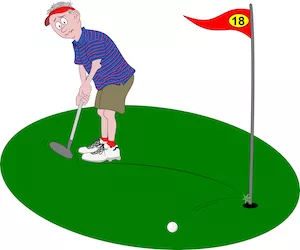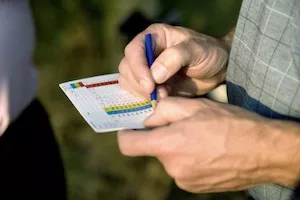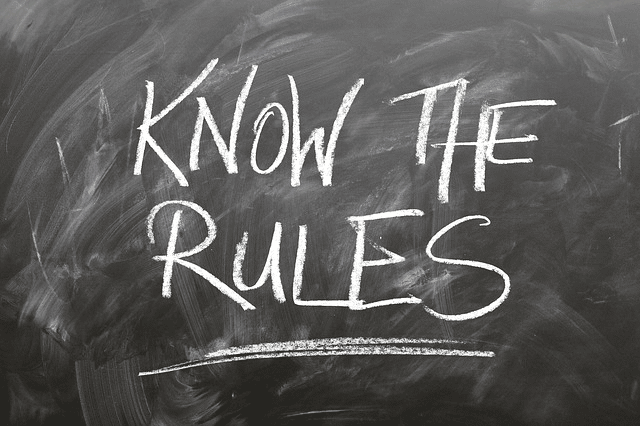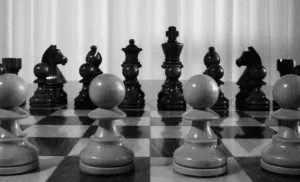Match play can be an exciting format, both for a spectator and a player. I’ll break down the format, rules, and scoring for you.
I’m also going to share some tips to win from a former Olympic athlete on how you can approach your own match play event.
How the match play format works
What is match play in golf?
The definition of match play, according to the USGA, is a “form of play where a player plays directly against an opponent head-to-head.” Furthermore, “you win a hole by completing it in the fewest number of strokes, and you win a match when you are winning by more holes than remain”.
Quite simply, it’s like 18 separate games within a round of golf. Scoring is limited to a hole-by-hole basis, 1 point per hole. Once a player has gained a lead that is impossible for the other to overcome, the match is over.
Why match play is so popular

Head-to-head competitions can be fun for both spectators and players. The format can produce a lot of excitement, especially at the end when players are close in scoring. It also becomes a “team sport” when playing in groups, which can be fun.
Unlike stroke play, the overall score doesn’t matter. A player could have a total meltdown on a hole, but it only counts as 1 point for the winner of that hole.
The Ryder Cup is a fan favorite in professional golf. Tons of excitement and camaraderie among the players and fans. It is a giant match-play event. They do both team competitions and individual.
Local clubs all over the U.S. and Europe have implemented their own match play tournaments because it is so fun.
Rules of match play
The rules of match play in golf are simple. Normal stroke play rules are observed for the purposes of play. The only difference is in scoring and concessions.
Match Play Scoring

Holes are scored individually. You either win, lose, or tie (aka “halved”). You win a hole when it is completed in fewer strokes than your opponent, or your opponent concedes the hole.
No scorecards are needed in match play, but they can be used to keep track.
To track scoring, simply note a “+1”, “+2” and so on. Let’s say you tie the first 3 holes, you are all square through 3, or a simple “AS” on the card if you’d prefer. After a hole is won, that player would go to +1, or they are “up one”. If they lose the next hole, it brings you back to AS.
You might hear someone say they won “3&2” or “2&1” etc. This means they were 3-up with 2 holes to play…or 2-up with 1 hole to play. The bigger that number, the bigger the thumping. The fastest possible victory is 10&8.
Match play can be played with either “Gross” or “Net” scores.
Gross Scoring
In gross scoring – Handicap is NOT taken into consideration. It is a straight-up match between individuals or teams.
Adjusting Scores for Net Matches with Handicaps
During a handicap match, the golfer with the higher handicap is given extra strokes equal to the difference in the players’ handicaps. For team play, you award 90% of the difference between the lowest handicappers on each team.
Let’s say we are playing an individual match. I am a 12 handicap and you are an 8. I will receive 4 strokes. Those 4 strokes are applied on the 4 most difficult holes based on the handicap index of each hole. You can find that on most scorecards, it is usually labeled “handicap”. 1 is the most difficult, and 18 is the easiest.
So in this case, I would be given an extra stroke on the 4 holes with a handicap of 1-4. That means, if we both end up with a 4 on one of these holes, I would win the hole. If I ended up with a 5 and you had a 4 on one of these holes, it would be halved. All other holes are played straight up.
Nuances to the Rules that you should know about

During play, if you or your opponent break a rule and both of you know it but ignore it, both of you are disqualified. If you are unsure of a rule, protect your rights and request a ruling.
During a hole, if your opponent asks how many strokes you’ve hit, you must provide that information. If it is your turn to hit, you can wait until after you’ve taken your shot, but it must be provided before your opponent takes their next shot.
Declaring an incorrect handicap hurts – If you declare too high, you are disqualified. If you declare too low, you must continue the match with the declared handicap. Mistakes happen, if you correct them prior to the first tee shot, you’re good.
Concessions
During play, you can either concede a stroke, a hole, or the entire match to your opponent. Once you make a concession, the ball is considered to be holed.
Once you make a concession, it cannot be withdrawn!
When you might concede a stroke? Maybe your opponent has hit a putt within a couple of inches of the hole, there is no need to make them putt out in that situation. Consider that they also have the ability to concede strokes etc on future holes and there is typically some level of reciprocation.
When you might concede a hole? Bad holes happen, maybe you end up taking a penalty, but your opponent is on in regulation. Maybe they’d have to 4-putt from 15 feet to tie the hole. Probably best to let them have it.
Rule Tip – You can practice putting or chipping between holes. (rule 5.2a)
When you might concede a match? When you’re tired of getting your butt whipped hole after hole! If it is not a close match, at some point you’ll know “it’s over”. Congratulate your opponent and buy them a beer.
Tips for winning at match play

I’ve got some strategies from a former Olympic athlete that can help you work through the pressure you’ll inevitably face during match play.
You’ll also need to manage your play against your opponent. It’s less about you against the course in match play!
Mental preparation and resiliency
Establishing a good pre-shot routine can keep you grounded and focused for each shot.
Meditation and written affirmations can be incredibly useful tools prior to any match to trick your brain into thinking “you’ve already been there”. This reduces nervousness when you are actually faced with the situation on the course.
Positive self-talk and Mindfulness are other important strategies you should apply!
To learn more about each of these topics, here is an article from a former Olympic athlete on the mental game in golf.
Course management
Just like any round of golf, pars are your friend. You don’t need to come out all gung ho trying to go for every green or hero shot. Play smart. Halved holes are good, be patient and let your opponent make mistakes.
Manage your opponent

Your strategy can rapidly change based on how your opponent is playing a particular hole, or overall.
If my opponent takes a penalty, I am automatically playing the rest of that hole a bit more conservatively.
Trick your opponent into taking risks. Let’s say we are coming up on a hole that is “drivable” but with a risk of hazards or OB. Your opponent has the honors. As we are approaching the tee, I’m pulling my driver out of my bag. Let them see you are “going for it”. This might influence them to do the same. After he hits it into the water, put your driver away and pull that trusty 5-iron out!
Use concessions wisely! Early on in the match, you can establish some rapport with your opponent by conceding a stroke here or there. They’ll likely reciprocate. But pay attention to their level of nervousness or the situation. It’s easy to miss a 3-foot putt, so pick and choose when to make them finish a hole.
Conversely, if your opponent isn’t giving you anything, make them finish that 2-inch putt. And be vocal about it. They’ll think you are an ass and their mind will be more concerned with your ass-hattedness than their own play, hopefully leading to mistakes.
Frequently asked questions
Final thoughts
I know many golfers whose favorite event of the year is match play. For good reason, it’s fun and exciting. It’s also used to determine club champions at a lot of local clubs around the nation.
Scoring is simple, once you understand it. Strategy and managing your opponent are definitely things you’ll want to explore if you want to win the match.
If you get a chance to play – take it! You’ll have a lot of fun.
Good luck on the golf course!
